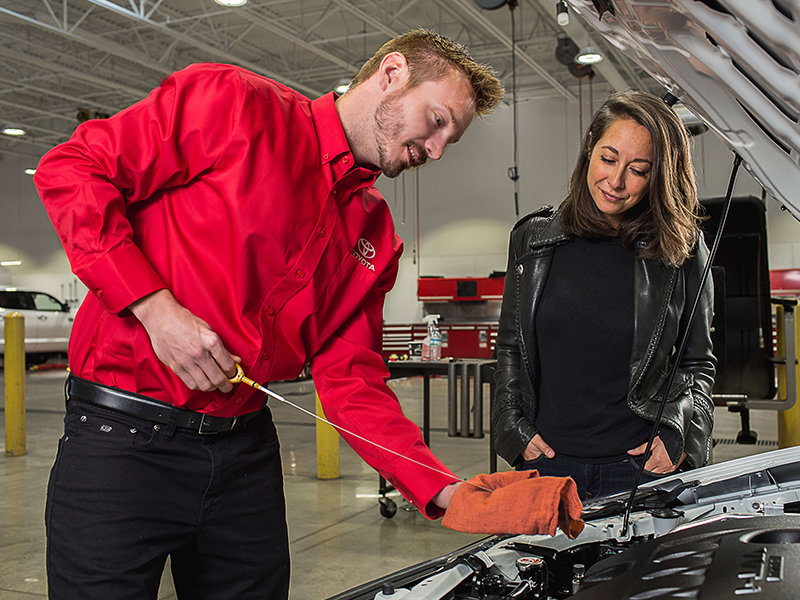
How to Select the Perfect 2025 RAV4 Powertrain for Your Lifestyle
Choosing the right powertrain for your 2025 Toyota RAV4 directly impacts your daily driving experience, from fuel costs to performance...
Read more

When it comes to keeping your Toyota in top shape, understanding the various fluids and liquids essential for its operation is crucial. Each fluid serves a unique function, playing a pivotal role in the vehicle's efficiency, performance, and safety. Proper maintenance of these fluids can prevent costly repairs and ensure that your vehicle performs optimally. Below, we will explore each type of fluid found in a Toyota vehicle, detailing their functions, importance, and maintenance guidelines.
Engine oil is the lifeblood of your Toyota's engine. It serves multiple critical functions: lubricating the engine's moving parts to reduce friction, helping to dissipate heat away from the engine, preventing rust and corrosion, and cleaning the engine by suspending dirt particles away from engine components. By maintaining a thin, lubricating layer between engine parts, the oil prevents direct metal-to-metal contact, reducing wear and tear and enhancing the engine's longevity.
Coolant, also known as antifreeze, is essential for regulating the temperature of your Toyota's engine. It circulates through the engine and radiator, absorbing heat and preventing the engine from overheating. Additionally, coolant contains corrosion inhibitors that protect the radiator and engine's internal components from rust and corrosion. Keeping the coolant at the right level and condition is vital, especially in extreme weather conditions, to avoid engine failure.
Transmission fluid lubricates the components of your Toyota's transmission to ensure smooth gear shifts and to prevent the transmission system from overheating. This fluid also helps in transmitting power from the engine to the transmission. Maintaining clean and adequate transmission fluid is crucial for the durability of the transmission system and for maintaining vehicle performance.
Brake fluid is a hydraulic fluid that transfers force under pressure from the brake pedal to the brake rotors. This fluid is essential for the effective functioning of your vehicle's braking system. It must remain free of contamination and at the correct level to ensure responsive braking.
Differential fluid, also known as gear oil, is crucial for cooling and lubricating the gears within the differential. This fluid ensures that the differential operates smoothly by reducing friction and wear between the gears, which is vital for the longevity and performance of the drive system, especially in vehicles with all-wheel drive or four-wheel drive systems.
Power steering fluid is the hydraulic fluid that transmits power in the steering system. It helps in reducing the effort needed to turn the steering wheel. Keeping this fluid at the proper level and condition is essential for smooth steering and to protect against wear in the steering pump and the rack and pinion system.
Battery cleaner is used to remove corrosion and build-up from battery terminals and connectors. Keeping the battery terminals clean is crucial for ensuring a strong connection and proper electrical flow, which are essential for reliable starting and functioning of your vehicle’s electrical system.
Brake cleaner helps in removing brake dust, oil, and other contaminants from the brake pads, rotors, and other components of the brake system. Regular cleaning with brake cleaner can enhance braking performance and extend the life of brake system components by preventing build-up that can lead to reduced efficiency or damage.
Windshield washer fluid is used to clean the windshield of dirt, bugs, and other debris while driving. It enhances visibility and safety, especially under adverse weather conditions. Using the appropriate fluid for different seasons can prevent freezing in winter or provide additional cleaning power.
Maintaining these fluids and using these maintenance products correctly can greatly contribute to the safety, performance, and longevity of your Toyota vehicle. Regular checks according to the recommended intervals will help ensure that each component functions as intended, keeping your vehicle in optimal condition.

How to Select the Perfect 2025 RAV4 Powertrain for Your Lifestyle
Choosing the right powertrain for your 2025 Toyota RAV4 directly impacts your daily driving experience, from fuel costs to performance...
Read more
Is the 2025 Land Cruiser Practical for Daily Driving?
The Toyota Land Cruiser has built its reputation on legendary off-road capability and durability over six decades in Canada. Now returning for...
Read more
2025 Toyota 4Runner vs Sequoia: Capability, Space and Price Comparison
The 2025 Toyota SUV lineup offers two standout options for adventure-seeking drivers. The all-new sixth-generation 4Runner brings fresh design,...
Read more